Simon Allford says entrants were ’both a contemporary celebration of excellence and a remarkable archive of architectural preoccupations’
The RIBA has revealed the 2021 President’s Medals winners.
This year’s winners of the RIBA’s annual awards for the world’s best student architecture projects include exploring data collection, an ecological courthouse and West African tribes.
President of the RIBA Simon Allford said 2021’s entrants for the President’s Medals, now in their 185th year, were “both a contemporary celebration of excellence and a remarkable archive of architectural preoccupations”.
Allford said: “The judges and I were impressed by the quality and commitment of all the entries, which explored many pertinent topics – from the climate emergency to cultural identity and the increasing impact of technology.”
Entries for the awards came from 102 architectural schools around the world.
The RIBA Silver Medal, the best design project produced at RIBA Part 2 or equivalent, was awarded to Tiia Partanen from the University of Strathclyde for The Cloud Cooperative.
It looked at the rise in data collection, internet surveillance and infrastructure, and storage on the cloud, which have caused people to lose control of their data. The project aims to challenge the current data monopoly and explores the creation of a secure, ethical new internet.
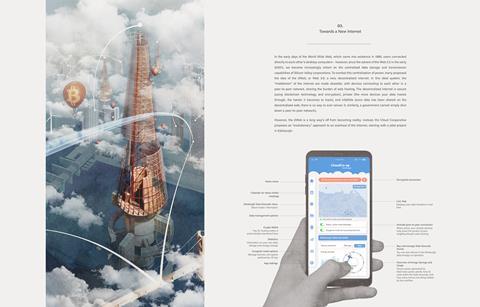
The RIBA Bronze Medal, for the best design project produced at RIBA Part 1 or equivalent, went to Ben Foulkes, from The Bartlett School of Architecture, for Seeding Swanscombe Marshes.
Foulkes proposed the construction of an ecological courthouse at the site of a planned theme park, acting as a preventative method for its further development.
The entry, Seeding Swanscombe Marshes, also looked at the regeneration of salt marshes in the area and the eventual degradation of the building through its natural materials, which will have ecological benefits to the landscape.
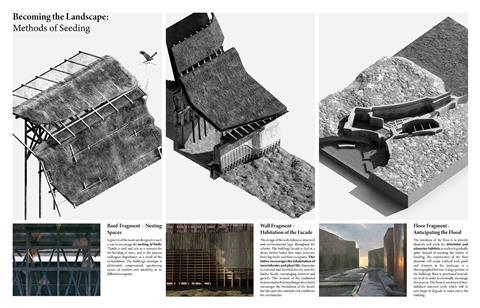
The RIBA Dissertation Medal was awarded to Richard Adetokunbo Aina, from Architectural Association, for A Culture of Craft: West Africa UNObjectified.
Aina’s dissertation explored how and why west African objects of particular tribes were crafted within their respective contexts and infrastructures, and how these sacred objects have been removed and dissociated.
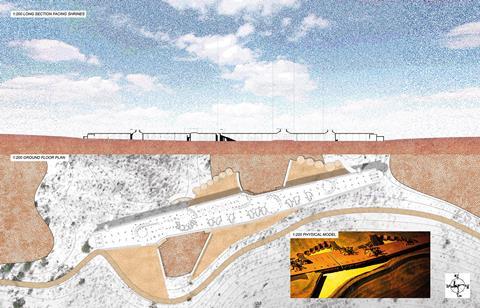
Recognising the importance of climate action in the development of architectural design proposals, the RIBA has awarded the RIBA Awards for sustainable design for the third year.
At Part 1, the award went to Gergana Negovanska from the Edinburgh School of Architecture and Landscape Architecture for The Last Straw: A Case for Reuse, Ratho Community Centre.
At Part 2 it went to Nicholas Honey and Robert Thackeray from Newcastle University for Reclaiming Playtime.
The Serjeant Awards for Excellence in Drawing were awarded to Desislava Cholakova from London Southbank University for Cathedral of Trade at Part 1, and to Elliott Afoke of Oxford Brookes University for The Dalston Hub: A Vertical Market at Part 2.
COMMENDATIONS:
For RIBA Silver Medal category:
Janusz Moore (De Montfort University) for Ruincarnation.
Daniel Pope (The Bartlett School of Architecture, UCL) for The Earthen Land Registry.
Finian Reece-Thomas (Kingston University) for An Art School in Enugu.
For RIBA Bronze Medal category:
Rachel Caul (University of Cambridge) for Reclaiming the Ruin.
Conor Lawless (London Metropolitan University) for The Workers’ Enclave.
Oliver Skelton (University of Nottingham) for Making Do.
For the RIBA Dissertation Medal category:
Ian Davide Bugarin (London Metropolitan University) for Bodies Split in Two: Contested Monsters and Queer Space in the Philippines.
Manuela Reitsma (Polytechnic University of Turin) for The Secular House: A Manual for Preservation and Seismic Improvement of Vernacular Stone Dwellings in Bhutan.
Ben Sykes-Thompson (Bartlett School of Architecture (UCL)) for ‘Overlooked Sounds’: Reinterpreting Traditional Japanese Architecture as Aural Space (High Commendation).


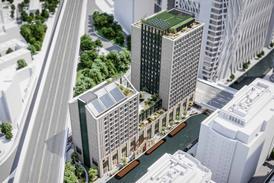

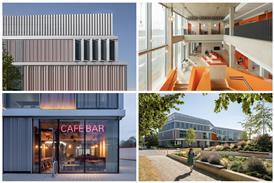
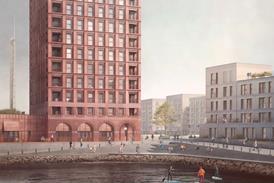










1 Readers' comment